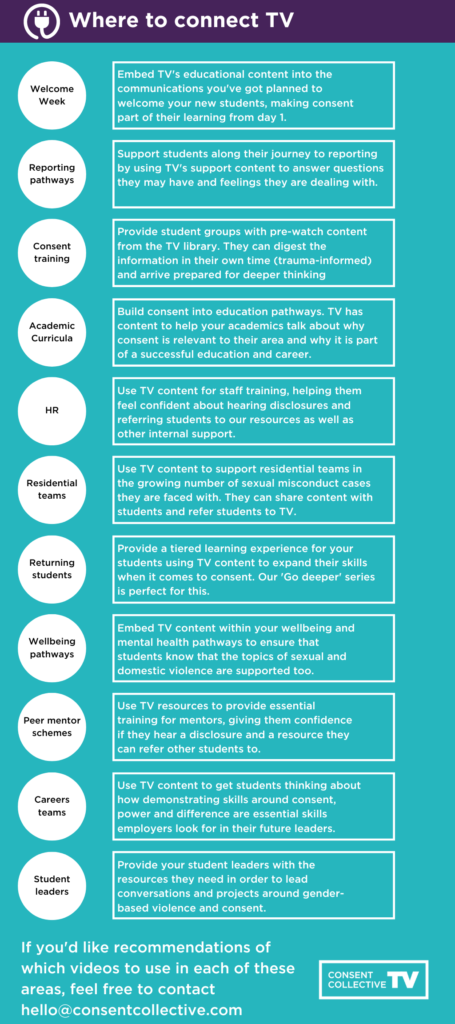
In this extra post, Cynthia Ellis highlights a few of the main places where Consent Collective TV content can be used across the university. The content is focused on consent, relationships and navigating power as part of our daily lives, including as part of education. Cynthia is co-founder of The Consent Collective, a not-for-profit organisation that develops a sophisticated approach to wellbeing and mental health, inclusive of conversations around trauma, sexual harassment, and sexual and domestic violence.
The start of the new academic year is an opportunity to take a fresh look at what resources are available to support colleagues at The University of Edinburgh. Consent Collective TV is one of the resources available to all staff, and we’re always eager to help you make the most of this library of content to support you in your various roles.
The content within the TV library is focused on consent, relationships and navigating power as part of our daily lives, including as part of education. These topics are about all of us, and it’s not just about what to do when things go wrong (although that is important) it’s also about personal development, leadership and continuous learning to support a rounded education and a successful career. These topics are interesting: they’re about people; and they form part of so many conversations and areas of work. Consent Collective TV content is there to offer support with these conversations.
We understand that talking about these topics is not always easy, and that’s why we provide you with expert content to support the growing number of places where these conversations need to happen. From welcoming new students to campus, to support and education, we use our expert knowledge and dedicated resources to equip with the tools that can be used in lecture halls, training rooms, support services and more.
Where to connect TV
We have highlighted below key areas where we’ve been working with our university partners to ensure TV is used to support them:
 These highlighted areas demonstrate a few of the main places where TV content can be used across the university, and there are more. If you would like to discuss your specific area, and how Consent Collective TV could support you, feel free to get in touch with us at hello@consentcollecrtive.com to arrange a conversation. We’d love to hear from you.
These highlighted areas demonstrate a few of the main places where TV content can be used across the university, and there are more. If you would like to discuss your specific area, and how Consent Collective TV could support you, feel free to get in touch with us at hello@consentcollecrtive.com to arrange a conversation. We’d love to hear from you.
A good place to start
if you’re not sure where to start, the answer is that it doesn’t really matter because we’ve made sure that the specialist content is curated for university audiences, be that staff or students. TV is packed with content, and we recommend that you browse the Channels to find the content most suitable to your needs (expect to see expert panels, guest lectures, our gameshow podcast, cooking shows and more!)
Log into TV here using your university email address and then visit the Channels:
- Channel 1 is the Home Channel where our content is designed to inspire and educate.
- Channel 2 is for anyone living, studying or working with the impact of sexual violence or relationship abuse.
- Channel 3 contains content that will help you teach or support someone who’s living with the impact of sexual violence or relationship abuse.
- Channel 4 is ‘Be Part of The Change’, if you’re interested in creating positive change in your organisation
- Channel 5 is ‘Spread the word’, and has information to help you spread the word.
Go Deeper with Consent series
To help you even further in getting started with using TV resources, we’ve provided a downloadable pdf which specifically refers to our ‘Go Deeper with Consent’ series, available on TV.
Equally Safe team
There is more information for supporting students and staff to access internal resources and support around Gender Based Violence on the linked ‘Equally Safe’ flyer.
As always, if you have any questions, our doors are open, feel free to contact us at hello@consentcollective.com.
 Cynthia Ellis
Cynthia Ellis
Cynthia is the co-founder of The Consent Collective, and helps organisations develop a sophisticated approach to wellbeing and mental health, inclusive of conversations around trauma, sexual harassment, and sexual and domestic violence. She supports university partners in using Consent Collective TV resources as part of the growing number of initiatives in tackling gender-based violence, consent education and student campaigns.



